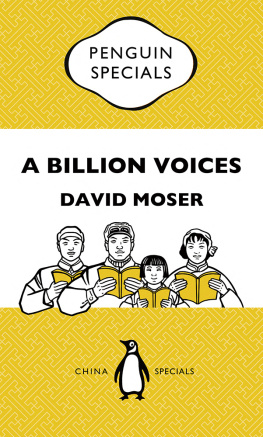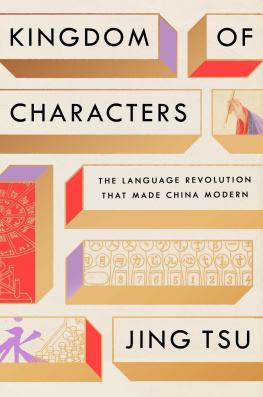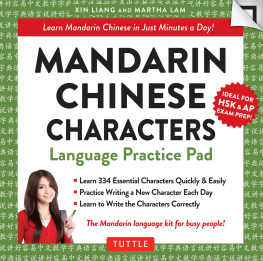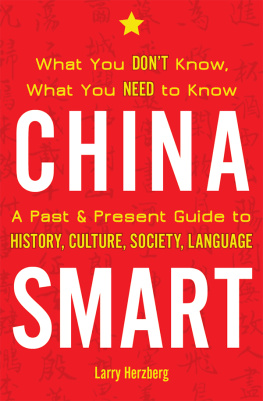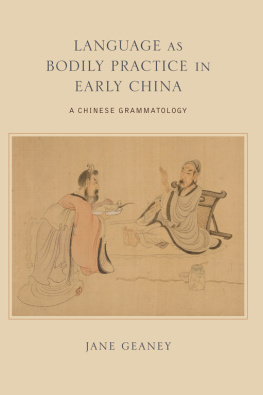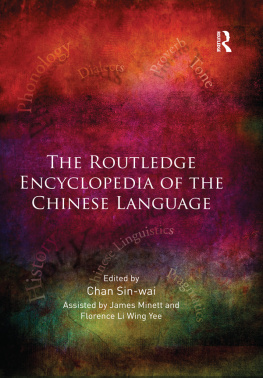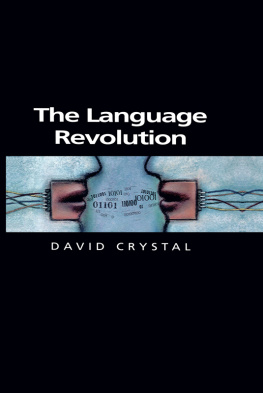BIBLIOGRAPHY
Note: Most of my account of the basic history of Putonghua is taken from John DeFrancis Nationalism and Language Reform in China (1950), Robert Ramseys The Languages of China (1987), and Ping Chens Modern Chinese: History and Sociolinguistics (1999).
Allen-Ebrahimian, Bethany, The Word that Broke the Chinese Internet, Foreign Policy, Tealeaf Nation blog, Feb. 27, 2015. http://www.foreignpolicy.com/2015/02/27/the-word-that-broke-the-chinese-internet-duang
Branigan, Tania, Sound Principle, The Guardian, Feb. 21, 2008. http://www.theguardian.com/world/2008/feb/21/china
Branigan, Tania, Protesters gather in Guangzhou to protect Cantonese language, The Guardian, Jul. 25, 2010. http://www.theguardian.com/world/2010/jul/25/protesters-guangzhou-protect-cantonese
Branigan, Tania, China Bans Wordplay in Attempt at Pun Control, The Guardian, Nov. 28, 2014. http://www.theguardian.com/world/2014/nov/28/china-media-watchdog-bans-wordplay-puns
Bristow, Michael, The man who helped simplify Chinese, BBC News online, Mar. 22, 2012. http://www.bbc.com/news/world-asia-china-17455067
Chen, Jia, and Zhao, Yinan, Chinese TV stations told to stop using English phrases, China Daily, Apr. 7, 2010. http://www.chinadaily.com.cn/china/2010-04/07/content_9692983.htm
Chen Jia, 40 million foreigners learning Chinese, China Daily, Dec. 13, 2010. http://www.chinadaily.com.cn/china/2010-12/13/content_11689902.htm
Chen, Ping, Modern Chinese: History and Sociolinguistics, Cambridge: Cambridge University Press, 1999.
Chen, Te-ping, Nowhere to Pun Amid China Crackdown, Wall Street Journal, China Real Time, Nov. 28, 2014. http://blogs.wsj.com/chinareal-time/2014/11/28/chinas-latest-crackdown-puns/
Shanghai Promotes Mandarin for 2010 Expo, China Daily, Sep. 14, 2005. http://www.china.org.cn/english/China/142078.htm
China Statistical Yearbook, 2014. http://www.stats.gov.cn/tjsj/ndsj/2014/indexeh.htm
Chinese Ministry of Education website: http://www.moe.gov.cn/publicfiles/business/htmlfiles/moe/s8316/201409/174957.html
DeFrancis, John, Nationalism and Language Reform inChina, Princeton: Princeton University Press, 1950.
DeFrancis, John, The Chinese Language: Fact and Fantasy, Honolulu: University of Hawaii Press, 1984.
DeFrancis, John, Visible Speech: The Diverse Oneness of Writing Systems, Honolulu: University of Hawaii Press, 1989.
Freiman, Daniel, The Role of the State in the Development of Language and Script in Modern China, in Victor H. Mair (ed.) Developments in Chinese Language and Script During the 20th and 21st Centuries, Sino-Platonic Papers 224, May 2012.
Fu, Sinian, Preliminary Discussion on Changing Over to a Phonetic Script for Chinese, Hsin chao, I, No. 3 [in Chinese], 1919.
Glasgow, Robert, The Continuing Debate Over the Use of Topolects in Present-day China, in Victor H. Mair (ed.) Developments in Chinese Language and Script During the 20th and 21st Centuries, Sino-Platonic Papers 224, May 2012.
Gottlieb, Nanette, and Ping, Chen, (eds.) Language Planning and Language Policy: East Asian Perspectives, Richmond: Curzon Press, 2001.
Govt orders TV anchors, guests to use Mandarin, China Daily, Jan. 6. 2014. http://news.xinhuanet.com/english/china/2014-01/06/c_133020948.htm
Guo, Longsheng, The Relationship Between Putonghua And Chinese Dialects, in Zhou, Mingliang, (ed.), Language Policy in the Peoples Republic of China: Theory and Practice since 1949. Boston: Kluwer Academic Publishers, 2004.
Hanan, Patrick, The Chinese Vernacular Story, Harvard East Asian Series. Boston: Harvard University Press, 1981.
Hannas, William C., Asias Orthographic Dilemma, Honolulu: University of Hawaii Press, 1997.
Hessler, Peter, Oracle Bones, New York: Harper-Collins, 2009.
Hilgers, Lauren, Zhou Libos distinctly Shanghai shtick, Los Angeles Times, Nov. 25, 2009. http://articles.latimes.com/2009/nov/25/world/la-fg-shanghai-comedy25-2009nov25
Hu, Shi, Baihua wenyan zhi youlie bijiao [Comparing the strengths and weaknesses of baihua and wenyan], in Hu Shi liuxue riji [The overseas study diaries of Hu Shi], 1916, p. 943. quoted in Kaske, 2008.
Ip, Hung-yok, Intellectuals in Revolutionary China, 19211949: Leaders, Heroes and Sophisticates, (Chinese Worlds). New York: Routledge, 2005.
Kang, Youwei, [Kang Yu-wei] Ta Tung Shu: Book of the Great Commonwealth, (Laurence G. Thompson, trans.). London: Allen & Unwin, 1958.
Kaske, Elizabeth, The Politics of Language in Chinese Education: 18951919, Leiden: Brill Academic Publishers, 2008.
LaFraniere, Sharon, A Chinese Voice of Dissent That Took Its Time, New York Times, March 2012. http://www.nytimes.com/2012/03/03/world/asia/a-voice-of-dissent-in-china-that-took-its-time.html?_r=0
Cina Esperanto-Ligo (website of the China National Esperanto Association ), http://www.espero.com.cn/old/epch/Cel/index.htm
Levenson, Rosemary, (ed.) Chinese Linguist, Phonologist, Composer and Author, Yuen Ren Chao: An Interview Conducted by Rosemary Levenson. The Bancroft Library, University of California, Berkeley China Scholars Series, Calisphere University of California online resource, 1977. http://content.cdlib.org/view?docId=hb8779p27v&brand=calisphere&doc.view=entire_text
Li, Yuming, and Li, Wei, (eds.), The Language Situation in China, Language Policies and Practices in China, vol. 1, 2,. Boston: de Gruyter Mouton, 2013.
Lim, Louisa, At 105, Chinese Linguist Now a Government Critic, NPR Asia, 2011. http://www.npr.org/2011/10/19/141503738/at-105-celebrated-chi-nese-linguist-now-a-dissident
Link, Perry, and Xiao, Qiang, From Grass-Mud Equestrians to Rights-Conscious Citizens: Language and Thought on the Chinese Internet, in Perry Link, et al (eds.) Restless China. New York: Rowman & Littlefield, 2013.
Liu, Jin, Signifying the Local: Media Productions Rendered in Local Languages in Mainland China in the New Millennium. Leiden: Brill Academic Publishers, 2013.
Liu, Jin, and Tao, Hongyin, Chinese Under Globalization: Emerging Trends in Language Use in China, New Jersey: World Scientific Publishing Company, 2012.
Luo, Chris, One-third of Chinese do not speak Putonghua, says Education Ministry, South China Morning Post, Sep. 23, 2014. http://www.scmp.com//news/china-insider/article/1598040/3-10-chinese-citizens-do-not-speak-putonghua-says-education
Mair, Victor, What is a Chinese Dialect/Topolect? Reflections on Some Key Sino-English Linguistic Terms, in Victor Mair (ed.) Sino-Platonic Papers, 29, September 1991.
Mair, Victor, (ed.), Developments in Chinese Language and Script During the 20th and 21st Centuries, Sino-Platonic Papers 224, 2012.
Mair, Victor, Its Not Just Puns that are being Banned in China, Language Log, Dec. 7, 2014. http://www.languagelog.ldc.upenn.edu/nll/?p=16197
Mair, Victor, Duang Language Log, Mar. 1, 2015. http://www.languagelog.ldc.upenn.edu/nll/?p=17913
Mair, Victor, More on Duang, Language Log, Mar. 19, 2015. http://www.languagelog.ldc.upenn.edu/nll/?p=18265
Moser, David, Why Chinese is So Damn Hard in Victor H. Mair (ed.), Schriftfestschrift: Essays on Writing and Language in Honor of John DeFrancis on His Eightieth Birthday, Sino-Platonic Papers, (University of Pennsylvania), 27, 1991.
Moser, David, What Chinese Characters Cant Do-Be-Do-Be-Do, on Pinyin.info site, 2001. http://pinyin.info/readings/moser/chinese_characters.html
Norman, Jerry, Chinese

